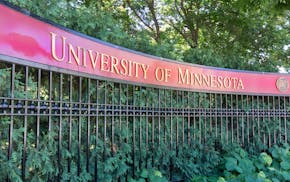The Rev. Curtis Herron, who for four decades led Zion Baptist Church, one of Minneapolis' largest and most influential black congregations, died March 18 in Minneapolis. Herron, who also spoke out often and eloquently on social justice issues, was 80.
He "was an extraordinary man who taught not just Christian fundamentals, but also how to apply the Bible to our responsibilities in the real world," said the Rev. Randolph Staten, a former state legislator. "His philosophy was that church started in the building, but ended in the world."
The Kansas City, Kan., native graduated from the University of Kansas and Midwestern Baptist Theological Seminary in Kansas City, Mo. In 1970, he brought his young family to Minneapolis to Zion Baptist, on the city's North Side.
He led his congregation with a strong voice and hand. As time passed, he also won the ear of many politicians, even as he challenged them, for his outspokenness on issues such as racism, affordable housing, job creation and police brutality. Among his earliest efforts was organizing a boycott against Carson Pirie Scott and Dayton's stores to protest employees' rudeness to black customers. He spoke out against apartheid in South Africa, U.S. involvement in foreign wars, and harsh post-9/11 security measures.
His highest-profile activism came in 1999, when he was one of several people, including Staten, arrested while protesting the demolition of public housing in north Minneapolis. Then-Mayor Sharon Sayles Belton expressed sympathy for the protesters' cause, and the trespassing charges were later dismissed.
In a Star Tribune commentary piece that September, Herron sharply criticized the newspaper's editorial-page support of the city's redevelopment approach, writing:
"City policies send a consistent message to its low-income citizens, particularly those of color: 'We don't want you here -- get out of town.' ... They seek not to reduce poverty, but to move the poor around or out of the city entirely to attract upper-income suburbanites. The city and the Star Tribune go to great lengths to disguise this motive with language about the de-concentration of poverty, expanded choice and mixed-income communities. What they really want is to purge 'undesirables.'"
Herron's life was not without challenge and sorrow. In 1992, he faced an effort to oust him at Zion after accusations of long-ago sexual misconduct and complaints about his leadership style that supporters said were unfair. But he prevailed and went on to lead the church for another 20 years. In 2001, he stood by his son, Minneapolis City Council Member Brian Herron, as he pleaded guilty to extortion. Brian Herron has since succeeded his father at Zion Baptist.
The Rev. Alfred Babington-Johnson said Herron's activism "was all part of the piece" of his Christian faith. "He was very serious about study of the Bible and brought a real intellectual discipline to it," he said.
"I cherish a statement he made once about times of challenge: 'Just because you're under attack doesn't mean that you aren't protected,'" Babington-Johnson said. "He said it in the context of a person of faith coming to the aid of a persecuted one, or of going through a season of disappointment. His legacy will be the faith he taught and shared."
In addition to his son, Brian, Herron is survived by his wife, Viola; three daughters, Dedra, Dana and Yolande; siblings and grandchildren. Services were held Saturday.
Pamela Miller • 612-673-4290

Teen suspect in Nudieland mass shooting arrested on murder, assault charges
'Human error' behind Robbinsdale shelter-in-place alert that was mistakenly sent countywide

Going to Wolves or Twins tonight? How to get there (and maybe avoid traffic).
Focusing on bringing football film into frame

